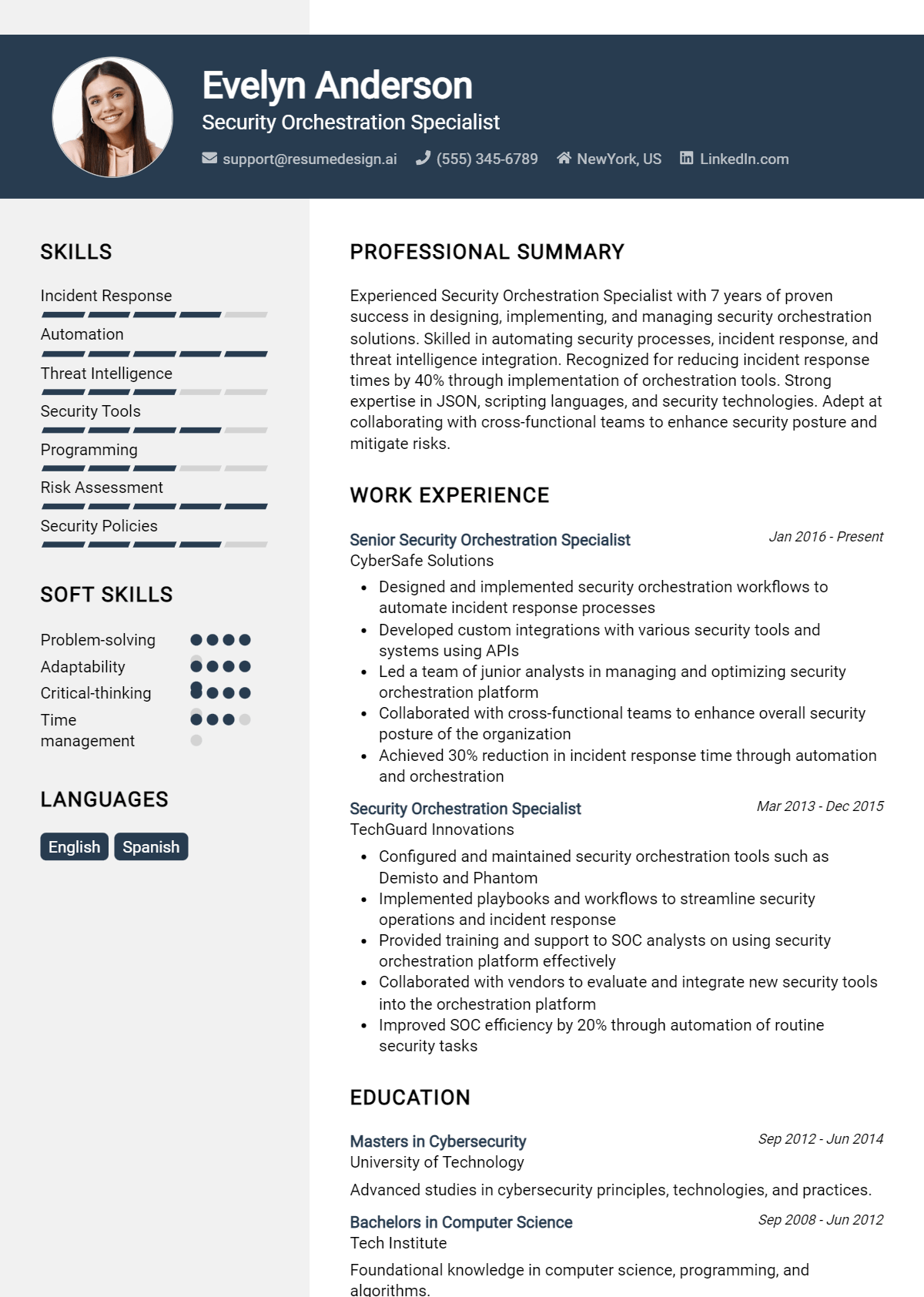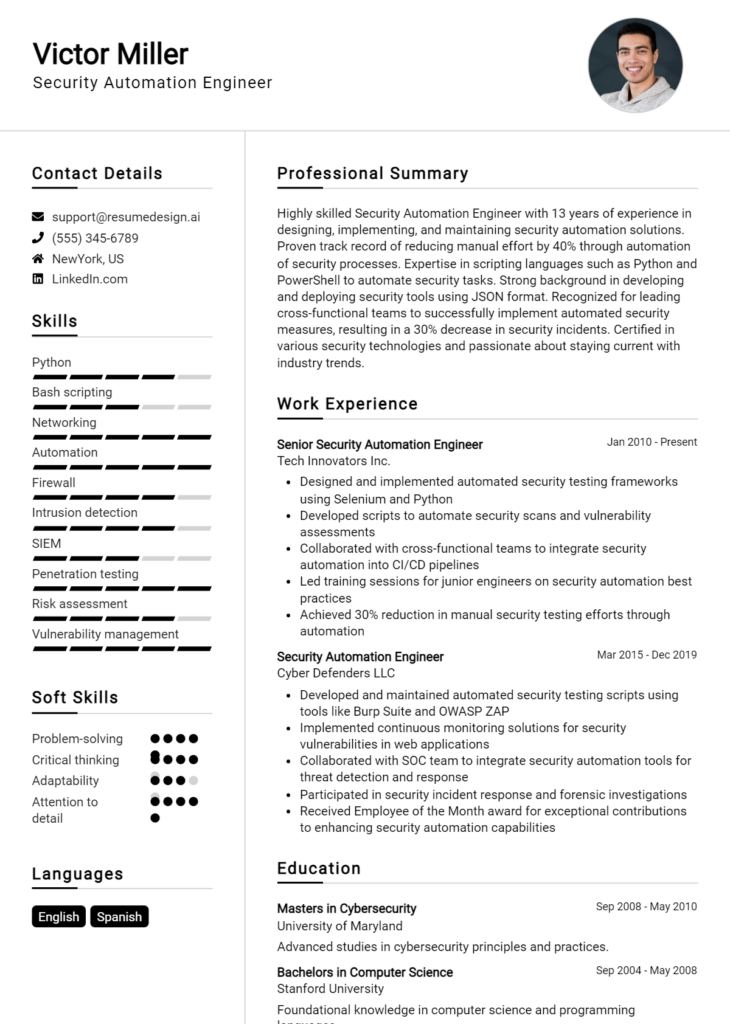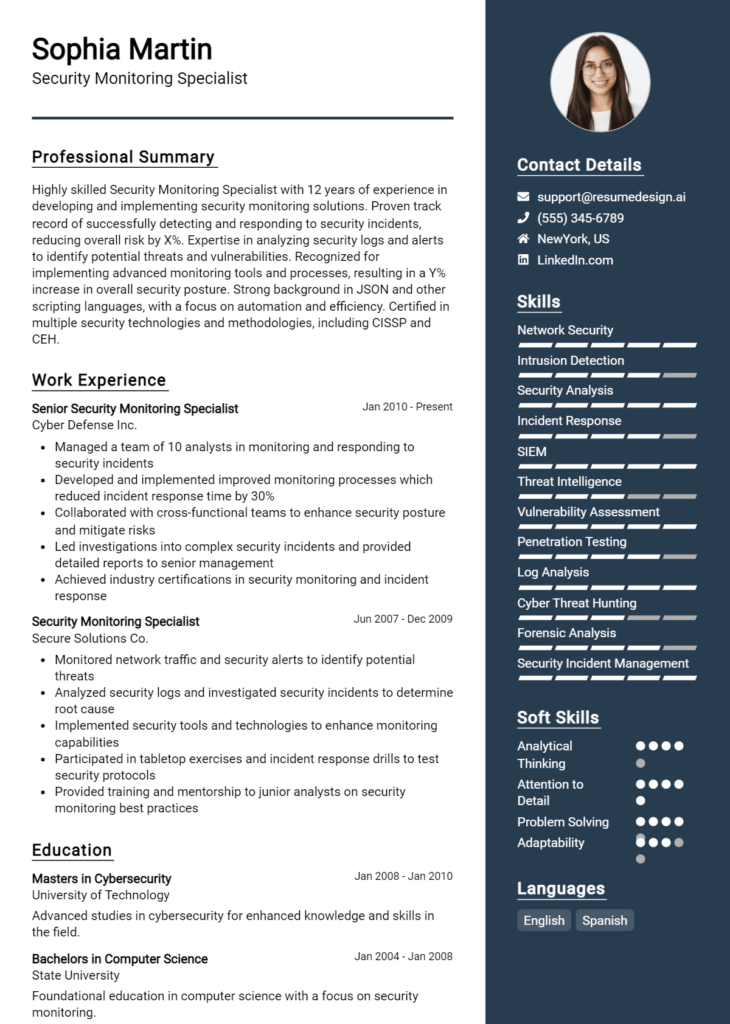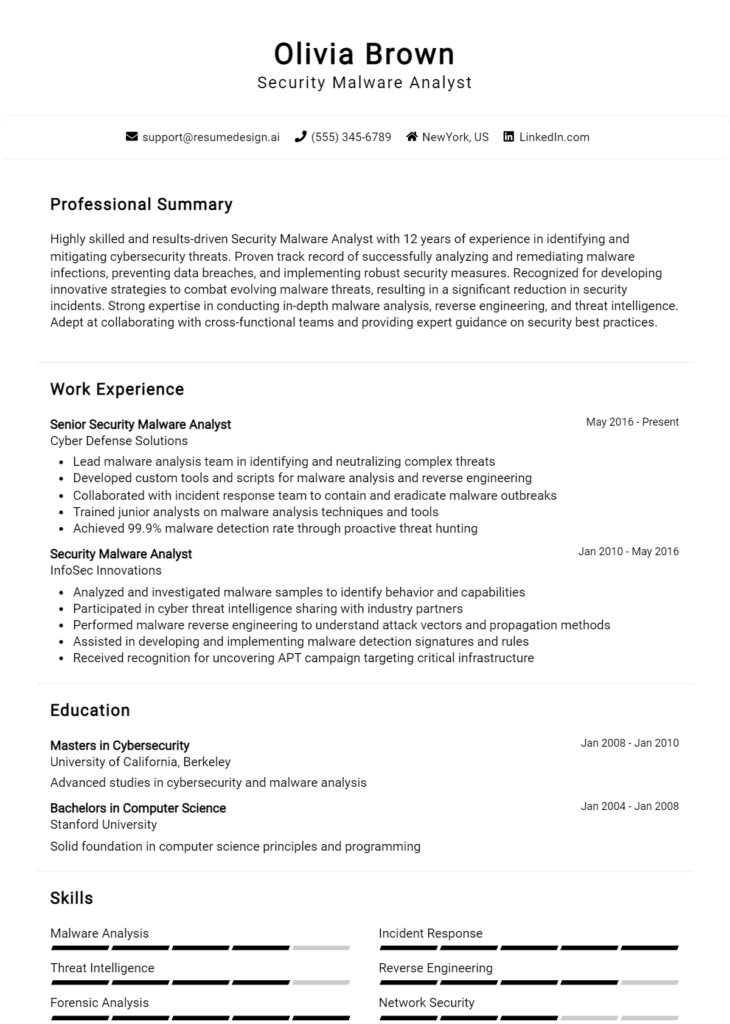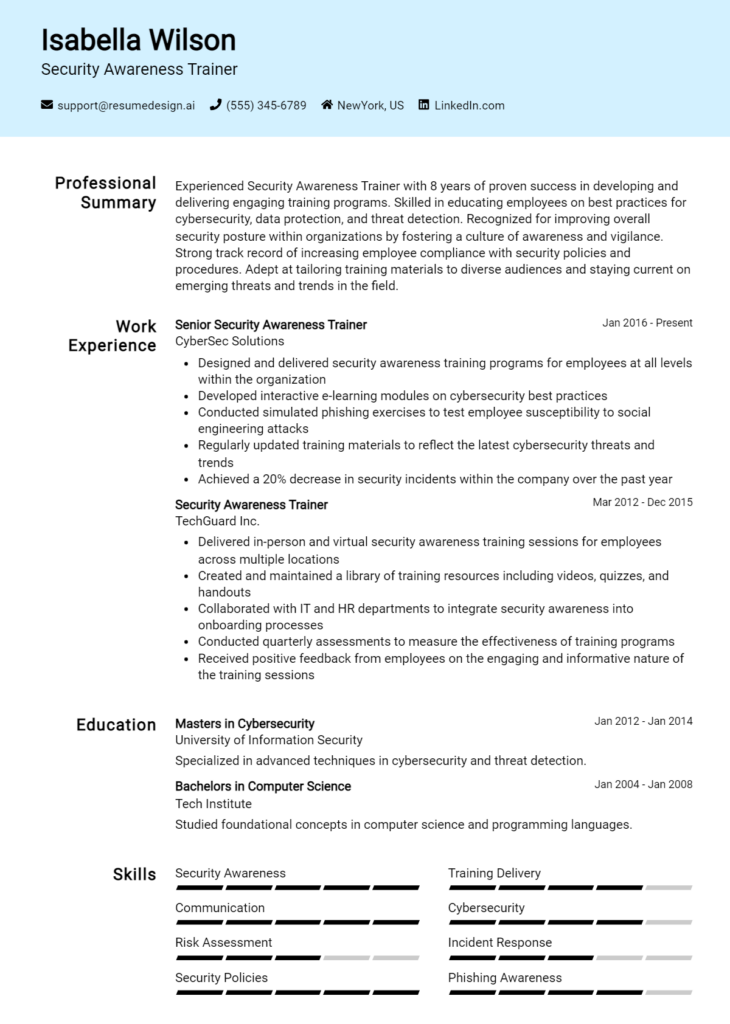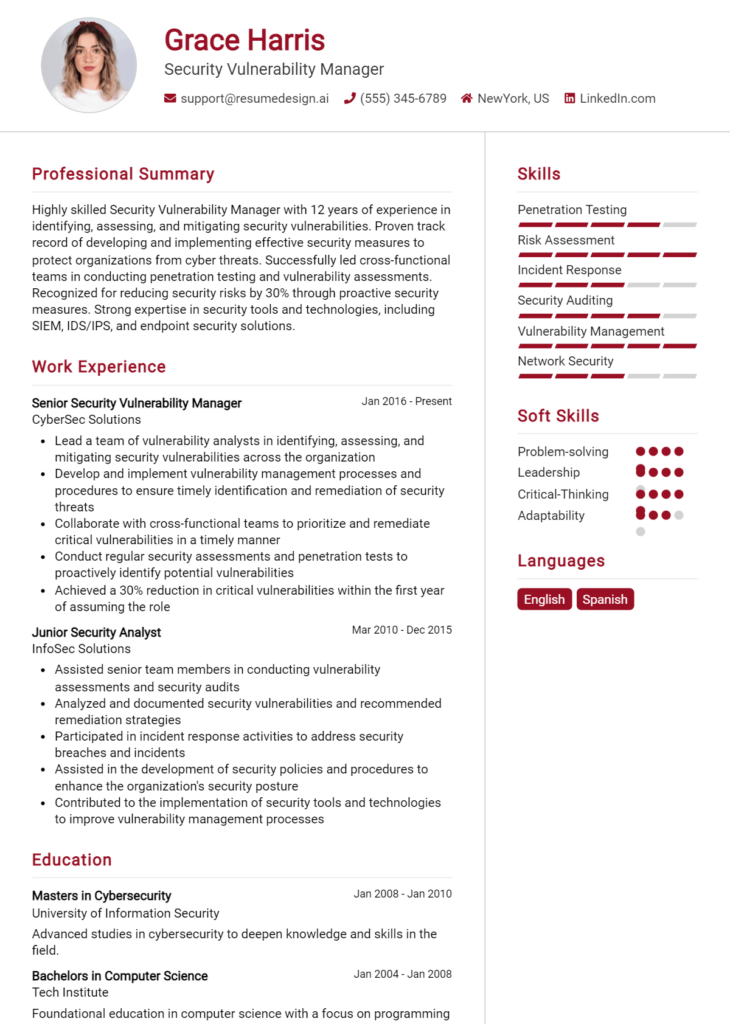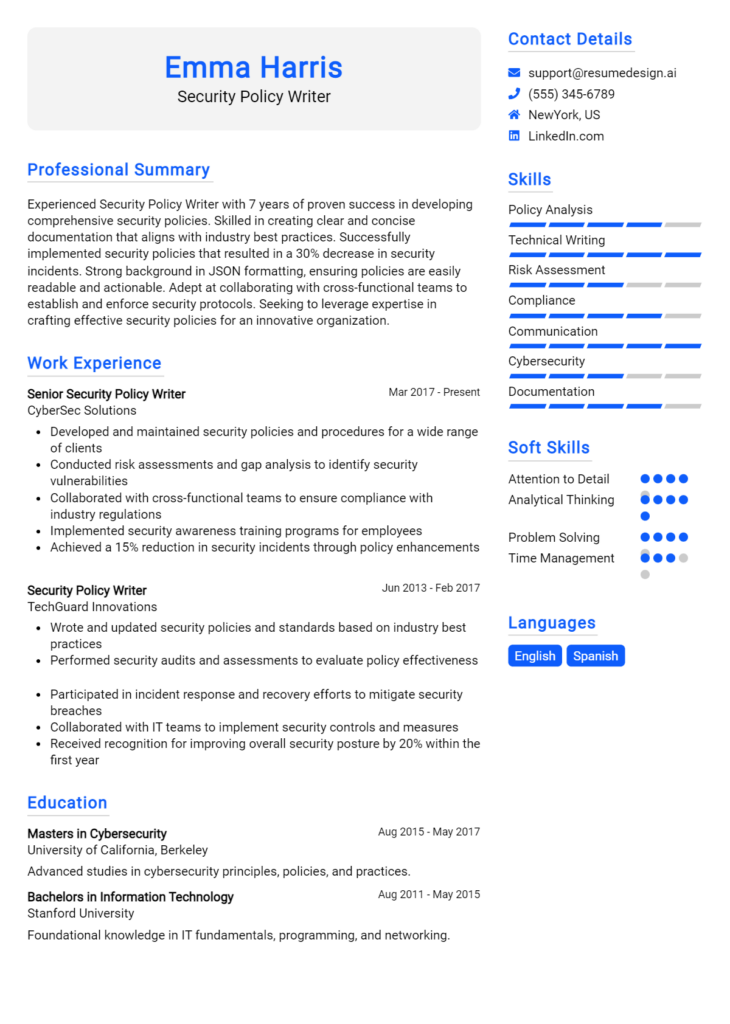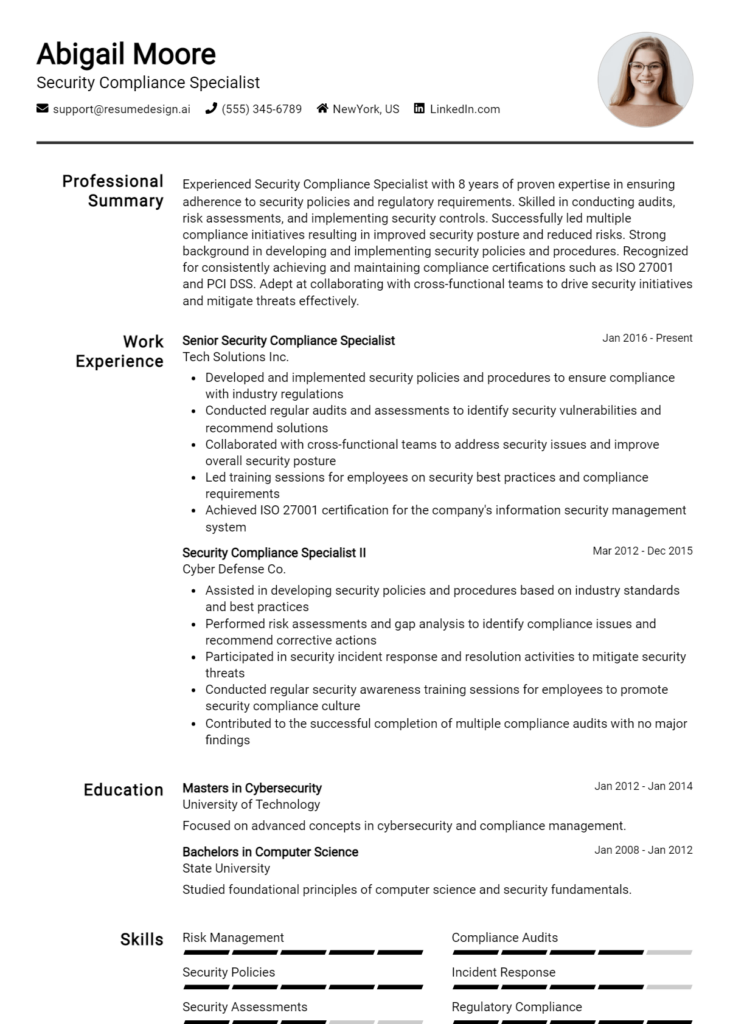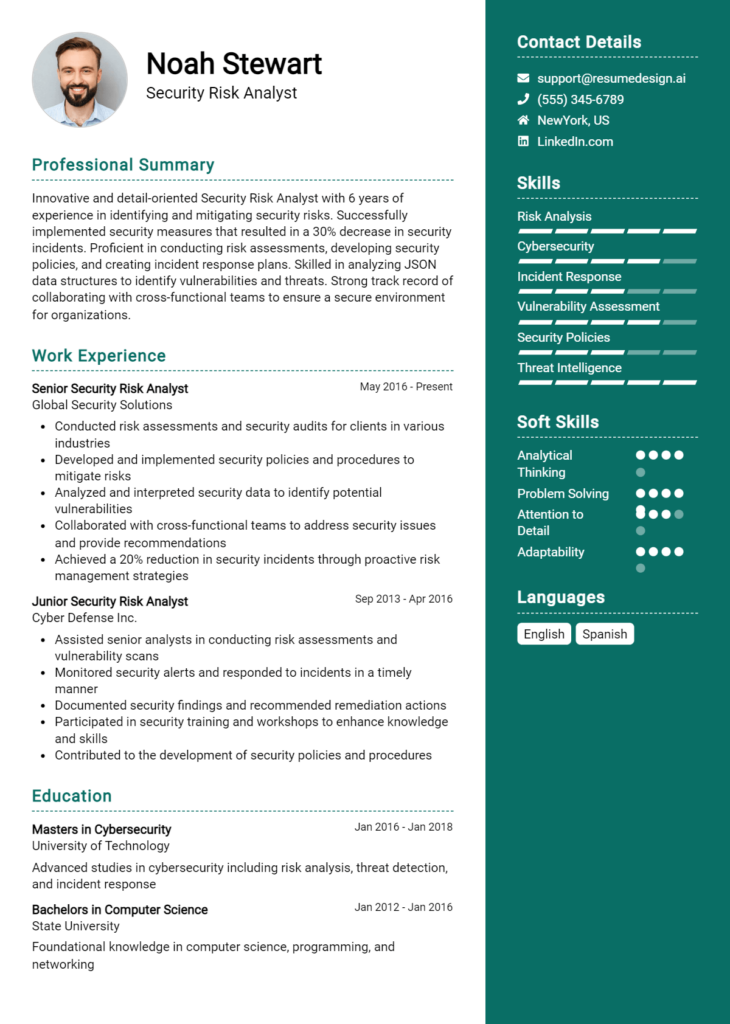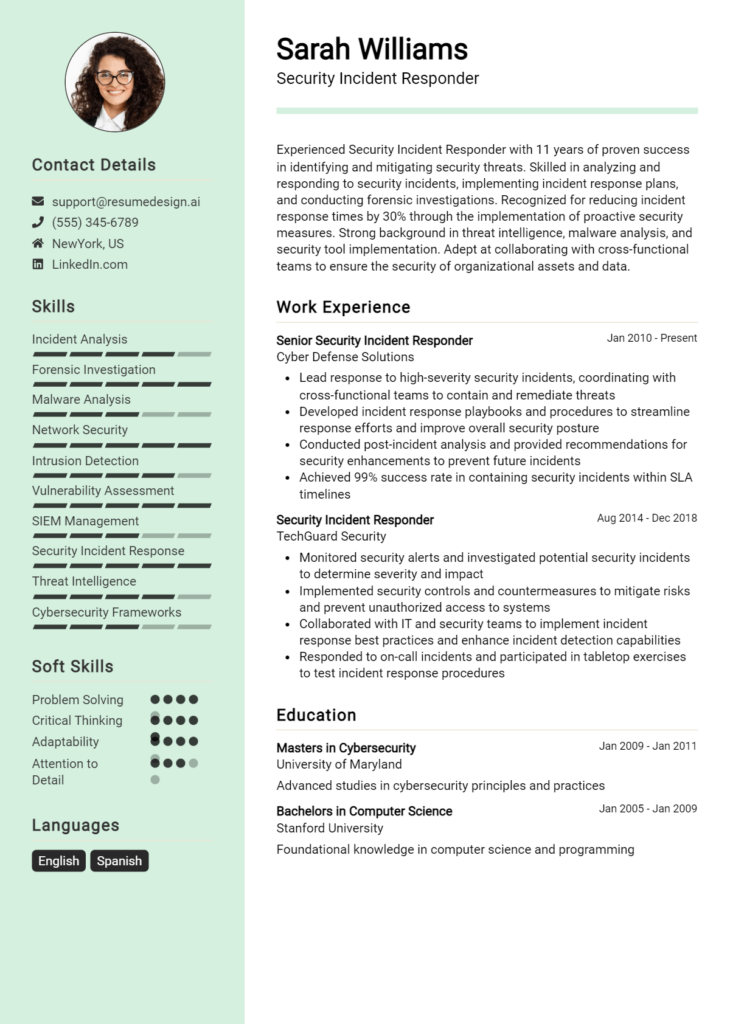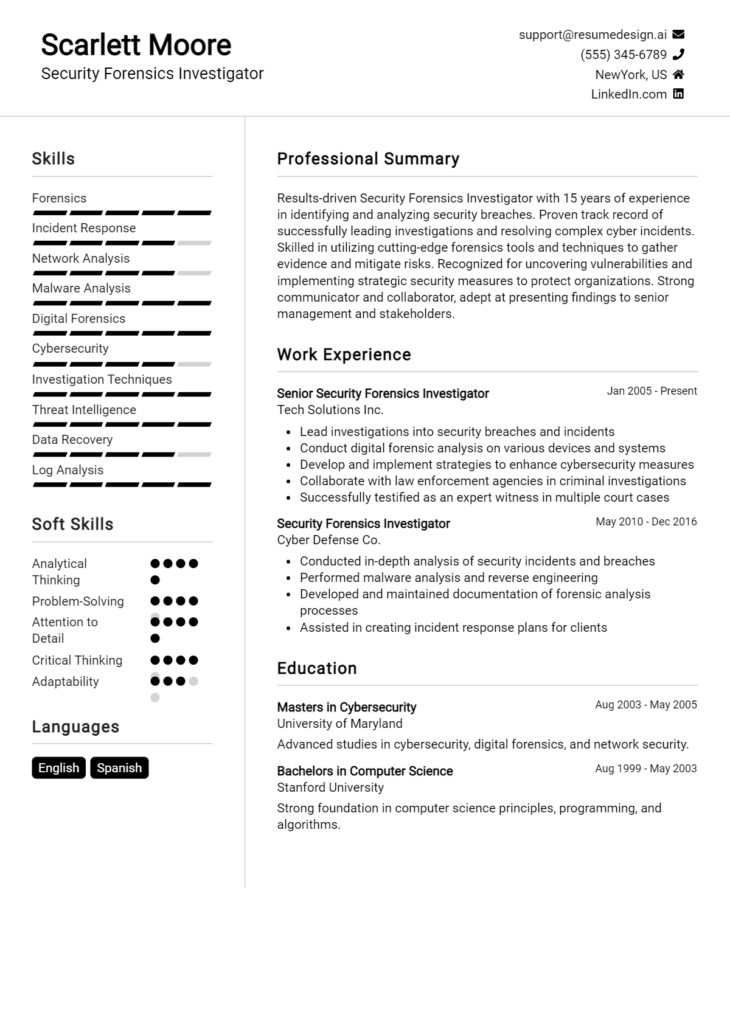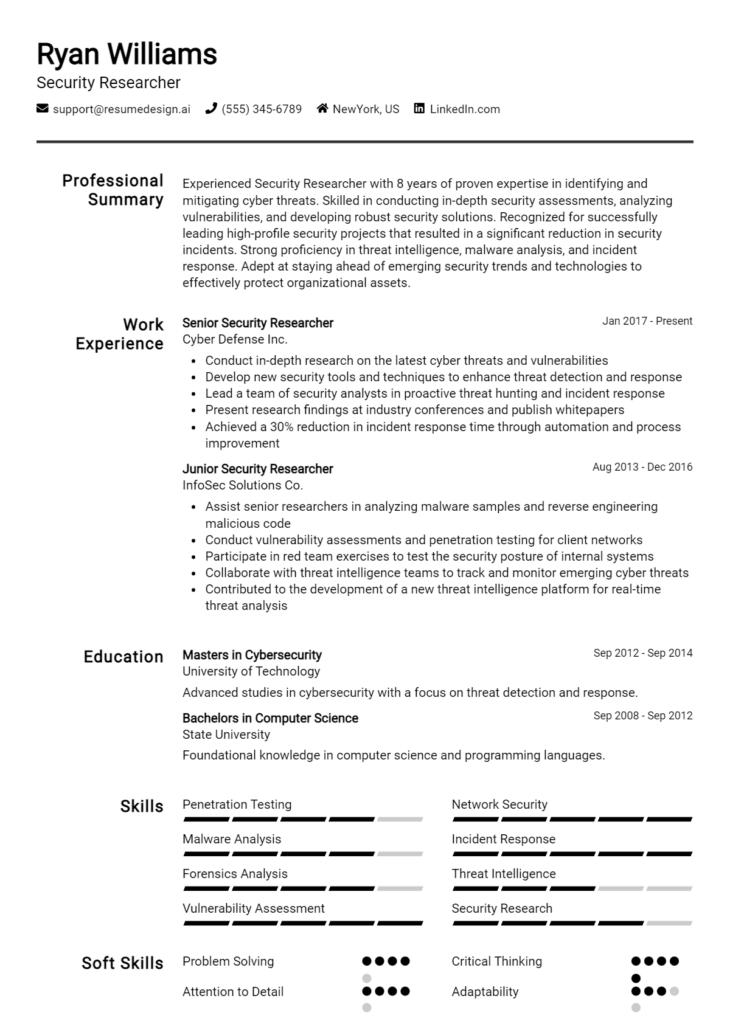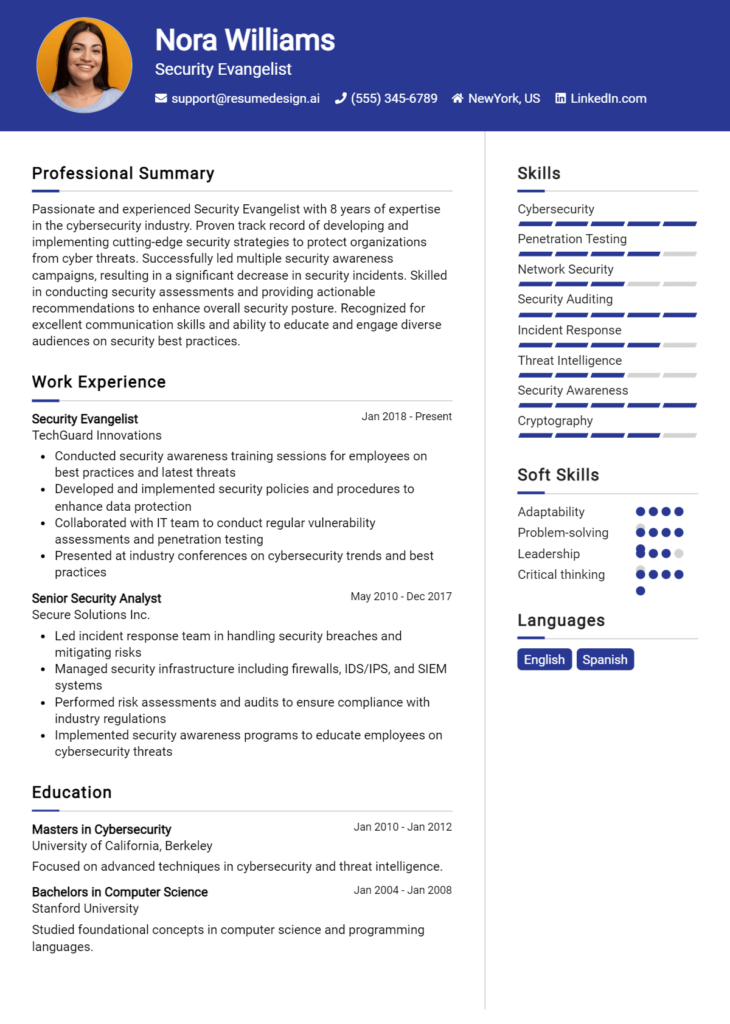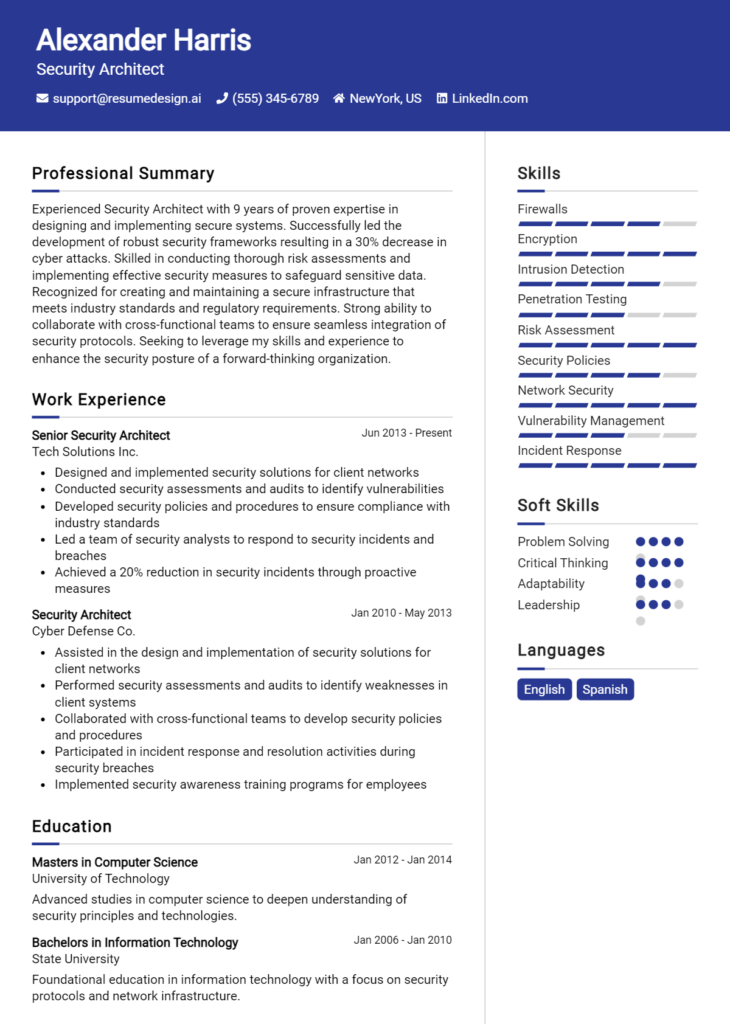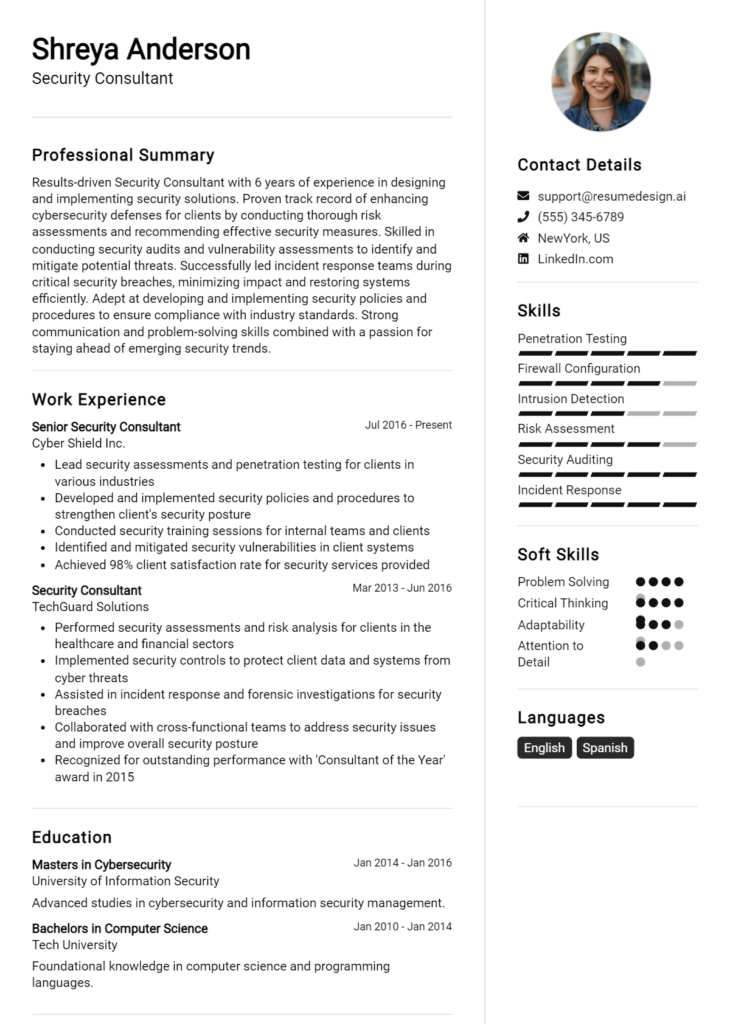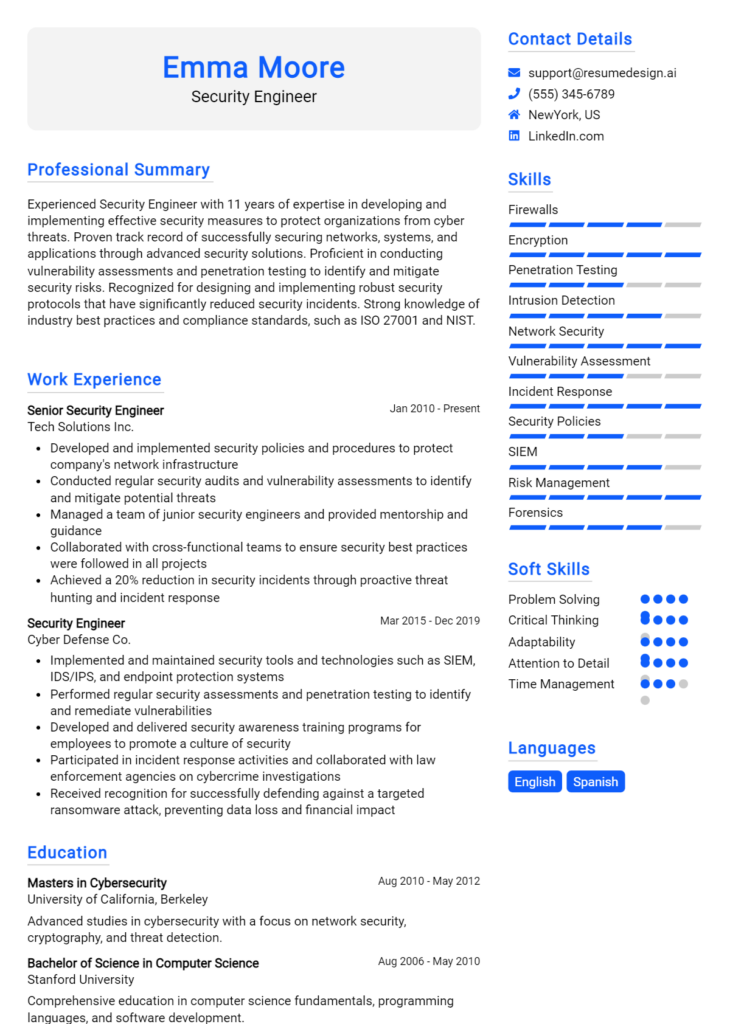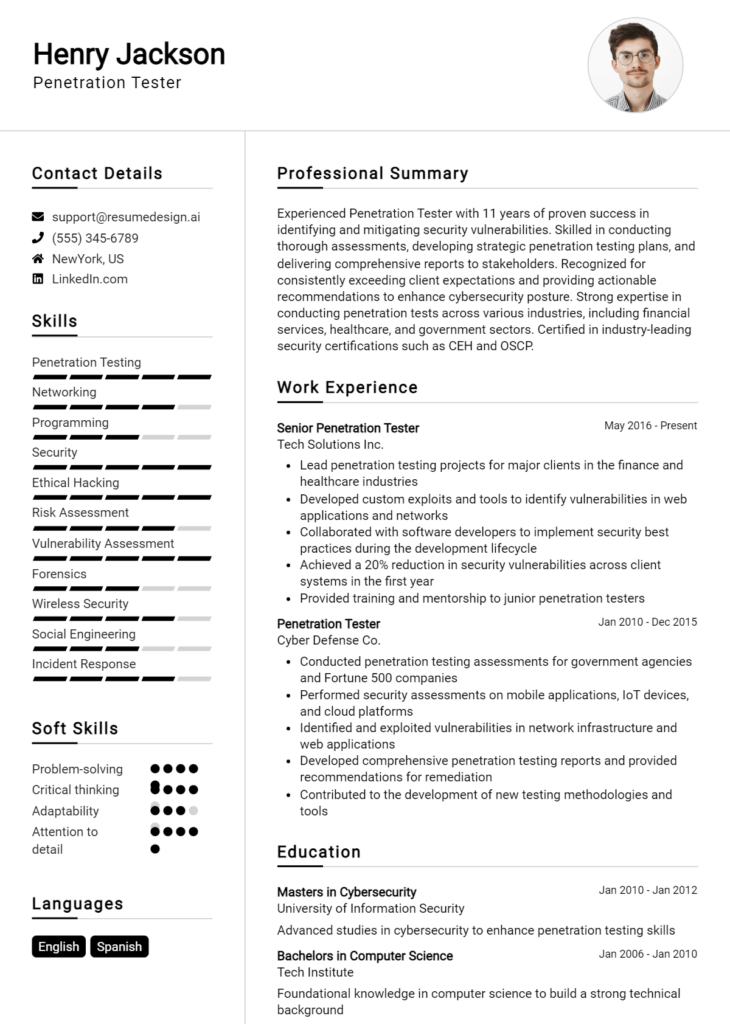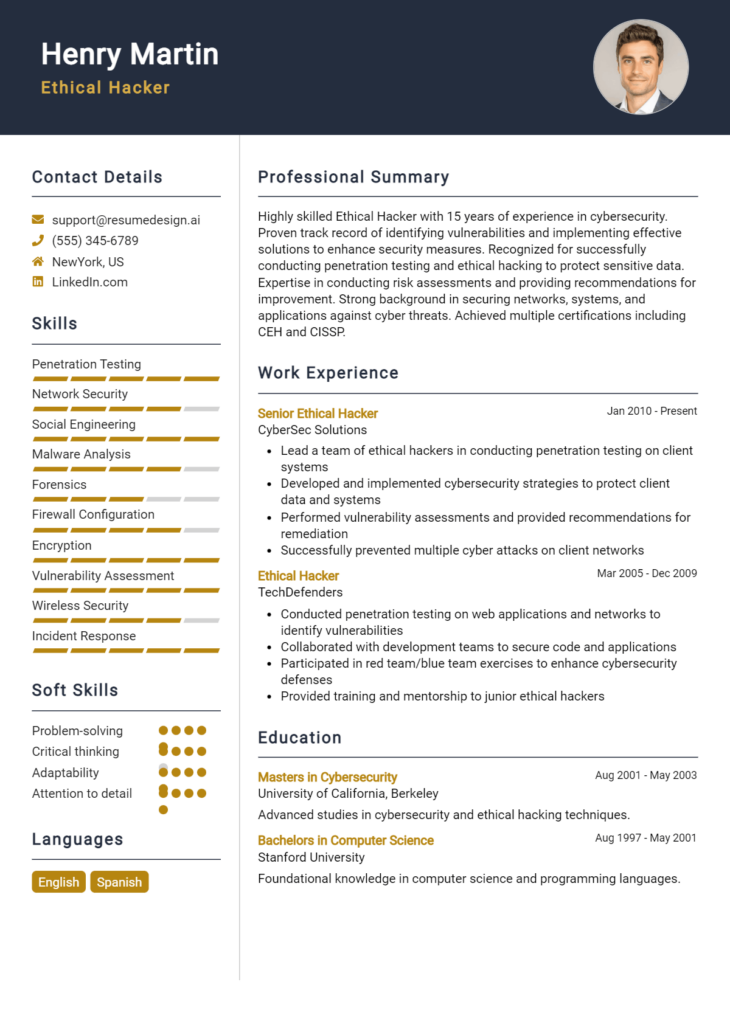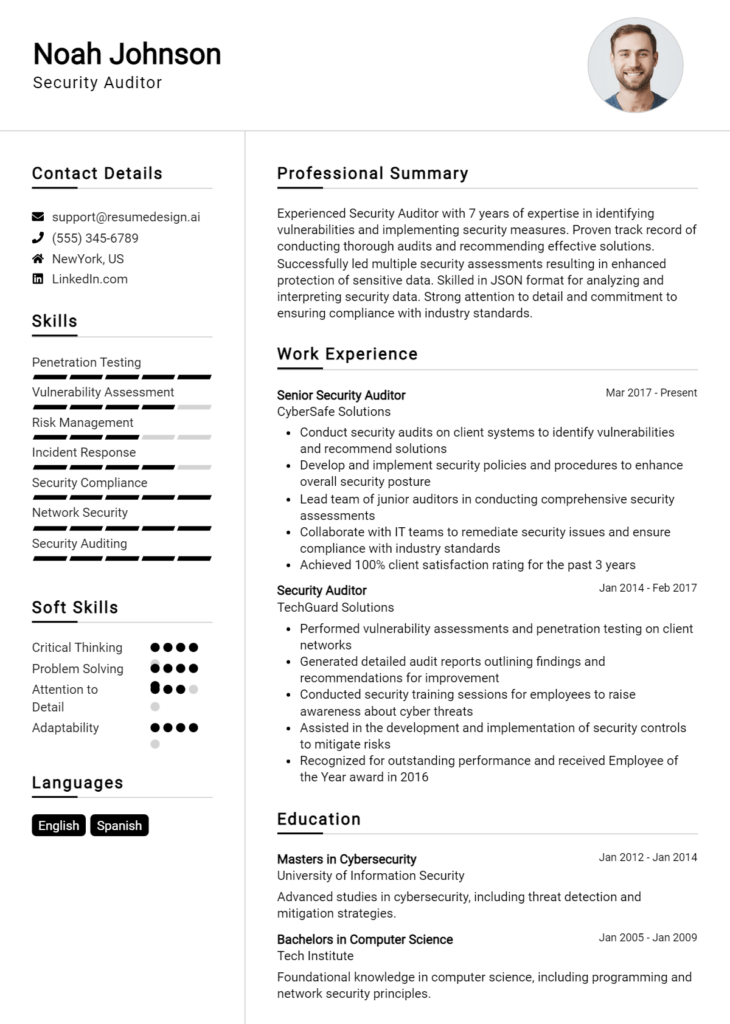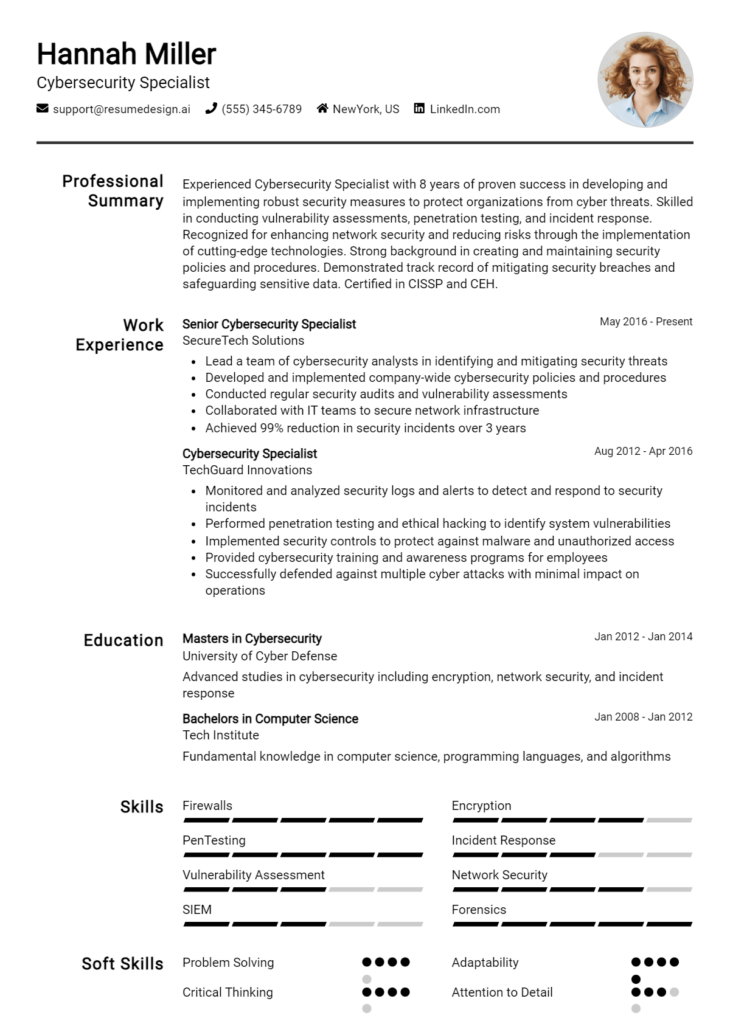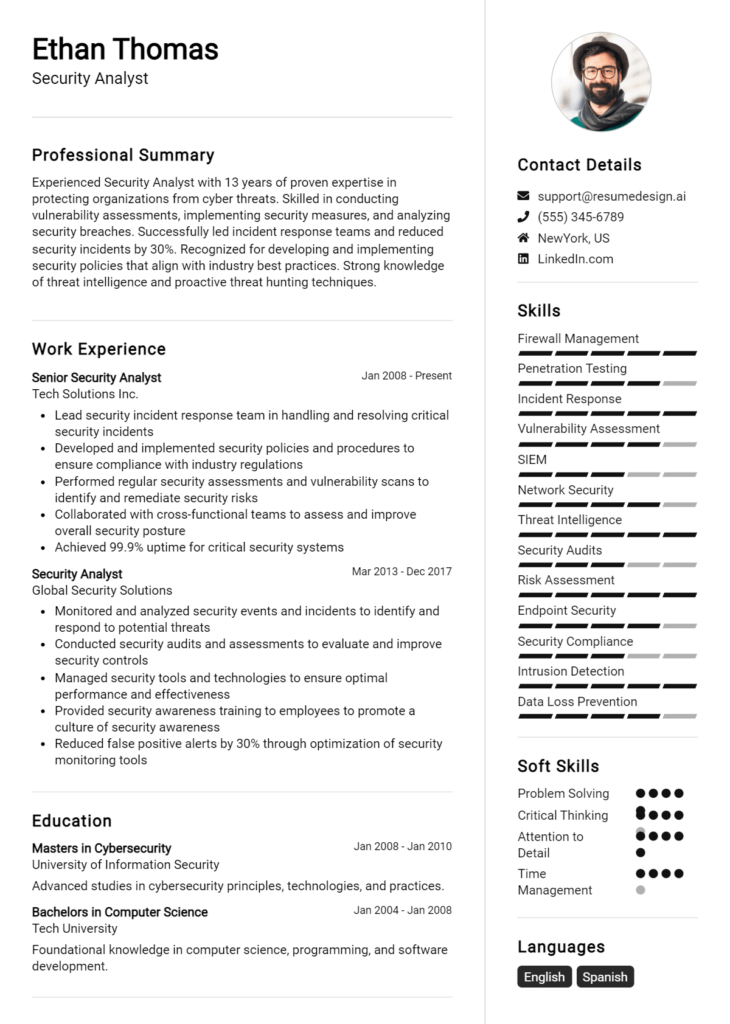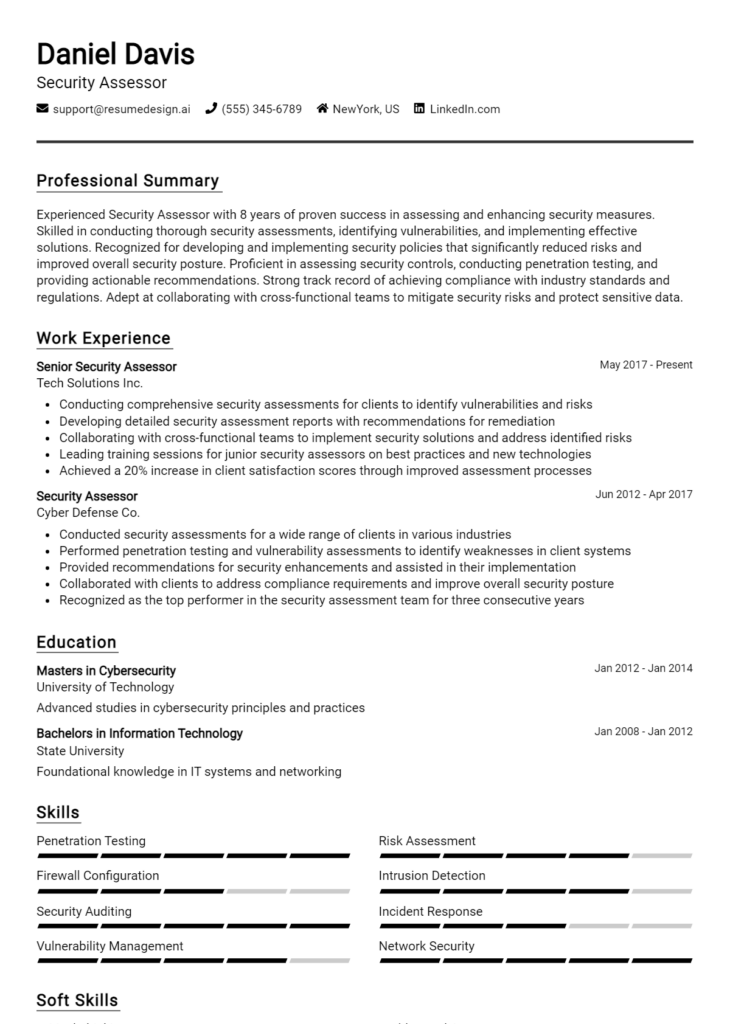Security Orchestration Specialist Core Responsibilities
A Security Orchestration Specialist plays a crucial role in integrating security tools, processes, and teams across an organization. This position requires strong technical knowledge, operational expertise, and exceptional problem-solving skills to streamline incident response and enhance security posture. By effectively bridging siloed departments, the specialist promotes collaboration that leads to quicker threat detection and response. A well-structured resume highlighting these qualifications demonstrates the candidate's ability to contribute significantly to the organization's security objectives.
Common Responsibilities Listed on Security Orchestration Specialist Resume
- Develop and implement security orchestration processes and workflows.
- Integrate various security tools and platforms for improved efficiency.
- Monitor and analyze security incidents to improve response times.
- Create and maintain documentation for security processes and procedures.
- Collaborate with IT and security teams to enhance incident response.
- Perform regular assessments of security tools and technologies.
- Provide training and support to team members on security best practices.
- Evaluate and recommend new security solutions to address emerging threats.
- Facilitate communication between different departments to ensure alignment on security initiatives.
- Assist in compliance audits and ensure adherence to security policies.
- Leverage automation to reduce manual efforts in security operations.
- Conduct root cause analysis of security incidents for continuous improvement.
High-Level Resume Tips for Security Orchestration Specialist Professionals
In today's competitive job market, a well-crafted resume is crucial for Security Orchestration Specialist professionals seeking to make an impactful first impression on potential employers. Your resume serves as a key marketing tool that not only showcases your technical expertise but also highlights your achievements and contributions within the field. It’s essential that your resume reflects both your skills and your ability to solve complex security challenges. This guide will provide practical and actionable resume tips that are specifically tailored for Security Orchestration Specialist professionals, ensuring you stand out in the hiring process.
Top Resume Tips for Security Orchestration Specialist Professionals
- Tailor your resume to match the job description by incorporating relevant keywords and phrases that reflect the specific requirements of the position.
- Highlight your relevant experience in security orchestration tools and frameworks, showcasing projects that demonstrate your hands-on expertise.
- Quantify your achievements by including metrics and KPIs, such as the percentage of threats mitigated or the time saved through automation.
- Emphasize industry-specific skills, such as knowledge of SIEM, SOAR, and incident response methodologies that are critical for the role.
- Showcase certifications related to cybersecurity, such as Certified Information Systems Security Professional (CISSP) or Certified Ethical Hacker (CEH), to validate your expertise.
- Use action verbs to describe your responsibilities and contributions to past projects, making your experience sound dynamic and impactful.
- Include a dedicated skills section that highlights both technical and soft skills relevant to the Security Orchestration Specialist role.
- Incorporate a professional summary at the beginning of your resume that succinctly outlines your background, skills, and career objectives.
- Keep your resume concise and focused, ideally limiting it to one or two pages, while ensuring all information is relevant to the job at hand.
By implementing these tips, you can significantly enhance your resume and increase your chances of landing a job in the Security Orchestration Specialist field. A polished and tailored resume will not only showcase your qualifications but also demonstrate your commitment to the role, making you a more attractive candidate to potential employers.
Why Resume Headlines & Titles are Important for Security Orchestration Specialist
The role of a Security Orchestration Specialist is crucial in today's digital landscape, where the need for robust cybersecurity measures is paramount. A well-crafted resume headline or title serves as the first impression a candidate makes on hiring managers, summarizing their key qualifications in one impactful phrase. This concise and relevant statement not only grabs attention but also sets the stage for the rest of the resume. By clearly indicating their expertise and suitability for the role, candidates can effectively communicate their value, making it essential for them to choose a headline that resonates with the job they are applying for.
Best Practices for Crafting Resume Headlines for Security Orchestration Specialist
- Keep it concise: Aim for one to two impactful sentences.
- Be specific: Tailor your headline to reflect the exact role of a Security Orchestration Specialist.
- Highlight key skills: Include relevant tools, technologies, or methodologies in your headline.
- Showcase accomplishments: Incorporate quantifiable achievements where possible.
- Use industry keywords: Align your headline with terms commonly found in job descriptions.
- Avoid jargon: Ensure clarity by avoiding overly technical terms that may confuse readers.
- Reflect your experience level: Indicate whether you are an entry-level, mid-level, or senior candidate.
- Maintain relevance: Ensure that the headline aligns with the specific job you are applying for.
Example Resume Headlines for Security Orchestration Specialist
Strong Resume Headlines
Expert Security Orchestration Specialist with 5+ Years in Incident Response and Automation
Proven Security Orchestration and Automation Expert Specializing in Threat Intelligence Integration
Dynamic Security Orchestration Specialist with a Track Record of Reducing Response Times by 30%
Weak Resume Headlines
Experienced Worker in Security
IT Professional Looking for a Job
The strong headlines are effective because they clearly communicate the candidate's expertise, relevant experience, and specific accomplishments, immediately making them stand out to hiring managers. In contrast, the weak headlines fail to impress due to their vagueness and lack of specificity, providing no real insight into the candidate’s qualifications or how they fit the role of a Security Orchestration Specialist. A powerful headline not only attracts attention but also sets the tone for a compelling resume narrative.
Writing an Exceptional Security Orchestration Specialist Resume Summary
A well-crafted resume summary is crucial for a Security Orchestration Specialist, as it serves as the first impression to hiring managers. This brief yet powerful statement quickly conveys the candidate’s key skills, experience, and accomplishments that are highly relevant to the role. An impactful summary not only captures attention but also sets the stage for the rest of the resume, showcasing the candidate's unique qualifications in a concise manner. Tailoring this summary to the specific job description enhances its effectiveness, making it a vital component of a successful job application.
Best Practices for Writing a Security Orchestration Specialist Resume Summary
- Quantify achievements: Use numbers and metrics to highlight your impact in previous roles.
- Focus on relevant skills: Identify and emphasize skills that match the job description.
- Tailor the summary: Customize the summary for each application to align with specific job requirements.
- Keep it concise: Aim for 2-4 sentences that deliver maximum information in a minimal space.
- Use industry terminology: Incorporate relevant keywords and jargon that demonstrate expertise in security orchestration.
- Highlight certifications: If applicable, mention relevant certifications that bolster your qualifications.
- Showcase problem-solving abilities: Illustrate your capability to address security challenges effectively.
- Maintain a confident tone: Use assertive language that reflects your competence and professionalism.
Example Security Orchestration Specialist Resume Summaries
Strong Resume Summaries
Results-driven Security Orchestration Specialist with over 5 years of experience in automating incident response processes, leading to a 40% reduction in response time. Proven expertise in integrating SIEM solutions and developing playbooks that enhance threat detection capabilities.
Dedicated Security Orchestration Specialist with a robust background in threat intelligence and incident management. Successfully implemented orchestration tools that improved operational efficiency by 30%, while reducing false positives by 25% within a year.
Innovative Security Orchestration Specialist adept at designing and deploying automated workflows that streamline security operations. Achieved a 50% increase in team productivity by implementing cross-platform integrations and enhancing real-time monitoring systems.
Weak Resume Summaries
Experienced security professional looking for a job in security orchestration.
I have skills in security and automation, and I want to contribute to a security team.
The strong resume summaries are compelling because they provide specific details about achievements, quantifiable outcomes, and relevant skills, making them directly applicable to the role of a Security Orchestration Specialist. In contrast, the weak summaries lack specificity, fail to highlight measurable results, and come across as overly generic, which diminishes their impact and effectiveness in catching the attention of hiring managers.
Work Experience Section for Security Orchestration Specialist Resume
The work experience section of a Security Orchestration Specialist resume is critical in demonstrating a candidate's capabilities and proficiency in the field. This section serves as a platform to showcase technical skills, such as knowledge of security tools and protocols, and highlights the ability to manage teams effectively while delivering high-quality security solutions. By quantifying achievements, such as reductions in incident response time or improvements in security posture, candidates can present their contributions in a compelling manner. Aligning work experience with industry standards is crucial to ensure relevance and impact in a competitive job market.
Best Practices for Security Orchestration Specialist Work Experience
- Highlight specific security orchestration tools and technologies utilized in past roles.
- Quantify achievements with metrics, such as percentage improvements in response times or reductions in security incidents.
- Emphasize collaboration with cross-functional teams to demonstrate teamwork and communication skills.
- Detail leadership roles in projects, showcasing your ability to guide teams in implementing security solutions.
- Align your experience with industry standards and frameworks, like NIST or ISO 27001, to exhibit familiarity with best practices.
- Include continuous learning and certifications that reinforce your commitment to staying updated in the security field.
- Utilize action-oriented language to convey a sense of proactivity and impact in your previous roles.
- Tailor your experience to the specific job description, ensuring relevance to the position you are applying for.
Example Work Experiences for Security Orchestration Specialist
Strong Experiences
- Led a team of 5 in the deployment of a centralized security orchestration platform, resulting in a 40% reduction in incident response time.
- Implemented automated threat detection processes that decreased false positives by 30%, significantly improving the efficiency of the security operations center.
- Collaborated with IT and compliance teams to align security protocols with ISO 27001 standards, enhancing organizational security posture and achieving certification.
- Developed and conducted training programs for 50+ staff on security best practices, increasing overall security awareness and reducing phishing incident reports by 50%.
Weak Experiences
- Worked on security projects with a team.
- Assisted in managing security systems and tools.
- Participated in meetings related to security improvements.
- Helped to create security policies and procedures.
The examples categorized as strong experiences effectively demonstrate quantifiable outcomes, technical leadership, and collaboration, showcasing a candidate's impact on their organization. In contrast, the weak experiences lack specificity and measurable results, making them less impressive and failing to convey the candidate's true capabilities and contributions to security orchestration initiatives. Strong statements provide clarity and context, while weak statements leave too much to interpretation, diminishing their overall effectiveness.
Education and Certifications Section for Security Orchestration Specialist Resume
The education and certifications section of a Security Orchestration Specialist resume is a crucial component that showcases the candidate's academic background, industry-relevant certifications, and commitment to continuous learning. This section not only demonstrates the foundational knowledge required for the role but also highlights specialized training and certifications that are directly aligned with security orchestration practices. By providing relevant coursework and recognized credentials, candidates can significantly enhance their credibility and present themselves as well-prepared for the demands of the job, making it easier for potential employers to assess their qualifications and fit within the organization.
Best Practices for Security Orchestration Specialist Education and Certifications
- Prioritize relevant degrees in cybersecurity, information technology, or related fields.
- Include industry-recognized certifications, such as Certified Information Systems Security Professional (CISSP) or Certified Information Security Manager (CISM).
- Highlight specialized training in security orchestration tools and platforms.
- Detail any relevant coursework that covers topics such as incident response, threat intelligence, or risk management.
- Keep certification dates current to reflect ongoing professional development.
- Consider including online courses or workshops from reputable organizations to showcase a commitment to continuous learning.
- Use clear and concise formatting to enhance readability and ensure easy scanning by hiring managers.
- Tailor the education and certifications section to align with the specific requirements and preferences outlined in the job description.
Example Education and Certifications for Security Orchestration Specialist
Strong Examples
- Bachelor of Science in Cybersecurity, University of Technology, 2021
- Certified Information Systems Security Professional (CISSP), 2022
- Advanced Security Orchestration Techniques, Online Course, 2023
- Certified Incident Handler (GCIH), Global Information Assurance Certification, 2023
Weak Examples
- Associate Degree in General Studies, Community College, 2015
- Certification in Basic Computer Skills, 2010
- Online Course: Introduction to Networking, 2018 (Not relevant to security orchestration)
- Diploma in Office Administration, 2012
The strong examples are considered effective because they demonstrate relevant degrees, advanced certifications, and specialized training that align closely with the responsibilities of a Security Orchestration Specialist. These credentials reflect a commitment to the field and an understanding of the current security landscape. Conversely, the weak examples illustrate outdated or irrelevant qualifications that do not contribute meaningfully to the candidate's ability to perform in the role, potentially diminishing their appeal to potential employers.
Top Skills & Keywords for Security Orchestration Specialist Resume
In the rapidly evolving landscape of cybersecurity, a Security Orchestration Specialist plays a critical role in ensuring organizations can effectively manage and respond to security incidents. A well-crafted resume for this position must emphasize both hard and soft skills that demonstrate expertise and adaptability in this dynamic field. Highlighting relevant skills not only showcases a candidate's qualifications but also aligns them with the specific needs of potential employers. A strong emphasis on skills in a resume can significantly enhance a candidate's visibility to hiring managers and applicant tracking systems, making it essential to curate a comprehensive list of abilities that reflect both technical know-how and interpersonal competencies.
Top Hard & Soft Skills for Security Orchestration Specialist
Soft Skills
- Strong analytical thinking
- Effective communication
- Problem-solving abilities
- Attention to detail
- Team collaboration
- Time management
- Adaptability
- Conflict resolution
- Critical thinking
- Leadership qualities
Hard Skills
- Security Information and Event Management (SIEM) tools
- Incident response protocols
- Threat intelligence analysis
- Security automation tools
- Network security protocols
- Risk assessment methodologies
- Forensics and malware analysis
- Vulnerability management
- Cloud security practices
- Knowledge of compliance standards (e.g., GDPR, HIPAA)
Incorporating these skills into a Security Orchestration Specialist resume, alongside relevant work experience, will enhance the overall appeal to hiring managers and set candidates apart in a competitive job market.
Stand Out with a Winning Security Orchestration Specialist Cover Letter
As a dedicated and results-driven Security Orchestration Specialist, I am excited to apply for the position at [Company Name]. With a robust background in cybersecurity and extensive experience in streamlining security operations, I am confident in my ability to enhance your organization’s security posture. My hands-on experience with security orchestration tools, coupled with a strategic mindset, allows me to effectively analyze and respond to security incidents, ultimately safeguarding sensitive data and organizational assets.
In my previous role at [Previous Company Name], I successfully implemented automated workflows that reduced incident response times by over 30%. By integrating various security technologies and leveraging threat intelligence platforms, I facilitated a cohesive response strategy that not only improved efficiency but also empowered the security team to focus on more complex threats. My collaborative approach ensures that I work closely with cross-functional teams, fostering an environment of shared knowledge and continuous improvement.
Moreover, I am well-versed in the latest industry trends and compliance standards, which positions me to effectively align security initiatives with organizational goals. I have a proven track record of conducting risk assessments and developing tailored orchestration strategies that address specific vulnerabilities within the infrastructure. My commitment to staying ahead of emerging threats enables me to adapt our security protocols proactively, ensuring that we remain resilient in the face of evolving cyber challenges.
I am eager to bring my expertise in security orchestration to [Company Name] and contribute to building a robust security framework that not only protects your assets but also supports your business objectives. I look forward to the opportunity to discuss how my skills and experience align with your needs and how we can work together to create a safer digital environment for your organization. Thank you for considering my application.
Common Mistakes to Avoid in a Security Orchestration Specialist Resume
When crafting a resume for the role of a Security Orchestration Specialist, it’s crucial to present your skills and experiences effectively to stand out in a competitive job market. However, many candidates make common mistakes that can detract from their qualifications and hinder their chances of securing an interview. Here are some key pitfalls to avoid while preparing your resume:
Lack of Specificity: Failing to provide specific examples of your achievements can make your resume seem generic. Use quantifiable metrics to showcase your impact, such as the percentage improvement in incident response times.
Overloading with Technical Jargon: While technical skills are essential, overwhelming the reader with jargon can obscure your abilities. Balance technical terms with clear explanations to ensure your resume is accessible.
Ignoring Keywords: Many companies use applicant tracking systems (ATS) to filter resumes. Neglecting to include relevant keywords from the job description may result in your resume being overlooked.
Listing Duties Instead of Achievements: Simply listing job responsibilities does not highlight your contributions. Focus on accomplishments and how you enhanced processes or resolved issues.
Poor Formatting: A cluttered or overly complex format can distract from your qualifications. Use clear headings, bullet points, and consistent font styles to create an organized and professional appearance.
Neglecting Soft Skills: Technical prowess is vital, but soft skills such as communication, teamwork, and problem-solving are equally important. Ensure your resume reflects your interpersonal abilities.
Not Tailoring the Resume: Sending the same resume for different job applications can be detrimental. Tailor your resume to each position, aligning your skills and experiences with the specific requirements of the job.
Including Irrelevant Experience: While it’s important to showcase your background, including unrelated work experiences can dilute your qualifications. Focus on experiences that directly relate to security orchestration and cybersecurity.
Conclusion
As we've explored throughout this article, the role of a Security Orchestration Specialist is increasingly vital in today's cybersecurity landscape. This position involves integrating security tools and processes to ensure a seamless response to threats, making it crucial for organizations to have skilled professionals who can navigate complex security environments. Key responsibilities include evaluating and optimizing security protocols, automating incident responses, and collaborating with various teams to enhance overall security posture.
In light of this, it’s essential for aspiring or current Security Orchestration Specialists to ensure their resumes accurately reflect their skills and experiences in this specialized field. Highlighting relevant technical expertise, certifications, and successful project implementations can make a significant difference in standing out to potential employers.
We encourage you to take a moment to review your resume as a Security Orchestration Specialist. To assist you in this process, consider utilizing helpful resources such as resume templates, a user-friendly resume builder, and insightful resume examples tailored for cybersecurity roles. Additionally, don’t forget to craft a compelling cover letter using our cover letter templates. Taking these steps can greatly enhance your job application and pave the way for your next career opportunity.

